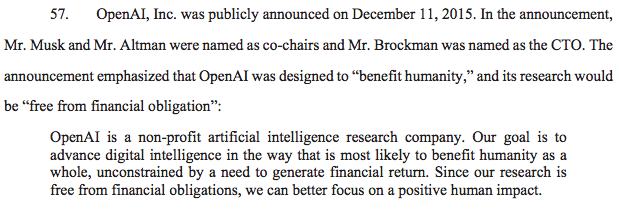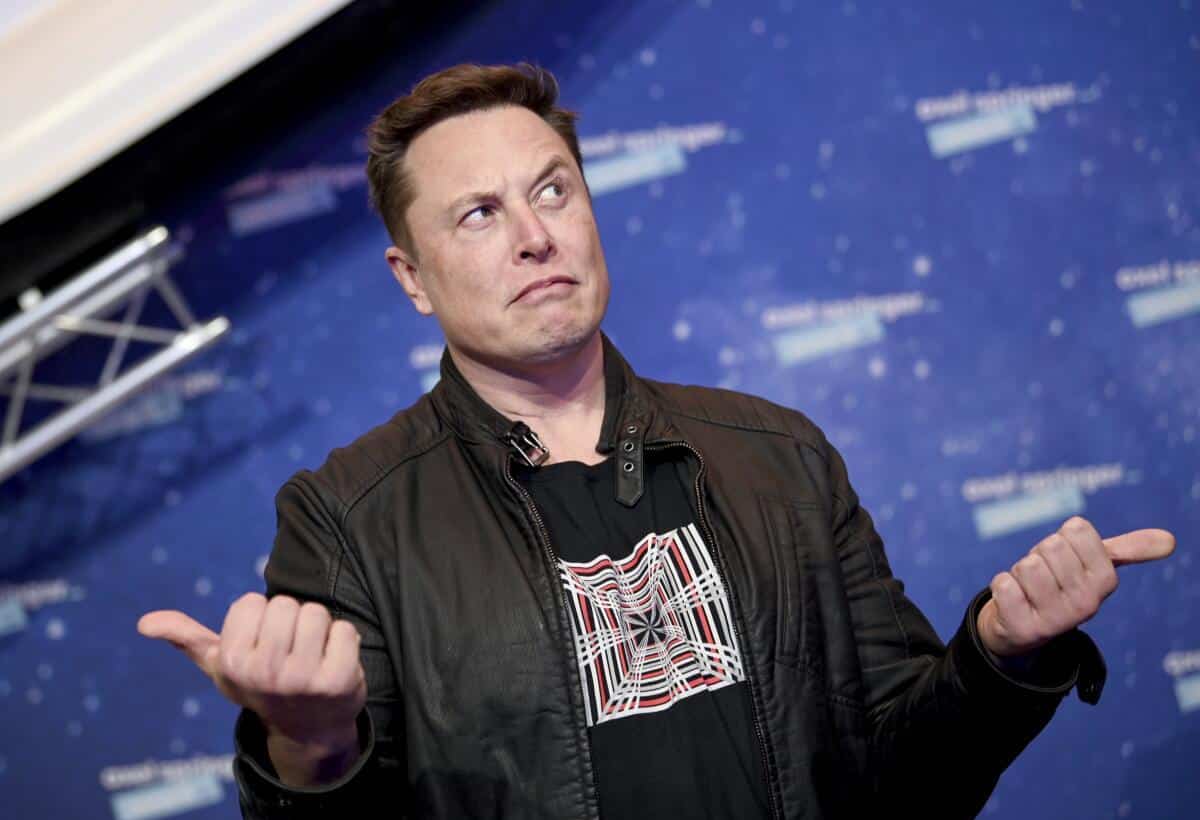Elon Musk has filed a lawsuit against the artificial intelligence lab OpenAI and its CEO Sam Altman, alleging that the company has abandoned its core mission to be a non-profit focused on developing AI to benefit humanity. It’s unclear whether he has any hopes of winning the lawsuit but he has a point. The company’s main subsidiary is now a for-profit business. It does have a profit cap, but it’s so high that it’s little more than a formality.
Musk, an early backer and co-founder of OpenAI, claims that he was convinced to help start the organization in 2015 based on promises made by Altman and other founders at the time that it would remain a non-profit and openly share its research.
However, the lawsuit argues that OpenAI has improperly increasingly focused on maximizing profits through exclusive partnerships, becoming a “closed-source de facto subsidiary” of Microsoft (MSFT).
What Does the Lawsuit Allege?
Filed on Thursday in California Superior Court, the lawsuit alleges that OpenAI and its founders reneged on contractual agreements made when Musk donated (as it was a non-profit at the time) over $44 million in funding for the venture between 2016 and 2020.
It claims that Altman and OpenAI’s co-founder Greg Brockman pitched Musk on the idea of an independent non-profit in 2015 that would counter major corporate AI efforts from the likes of Google and ensure that artificial general intelligence (AGI) — AI with human levels of general cognitive abilities — would be developed safely “for the benefit of humanity.”
OpenAI’s charter and founding documents enshrined principles like open access to its research to help guide the responsible development of AGI, according to Musk’s legal complaint.

However, the lawsuit claims that OpenAI began to abandon these principles around openness and focused increasingly on extracting value from its AI models rather than progress towards AGI or robust AI safety practices. Ironically, OpenAI is the only major AI maker that hasn’t yet made any of its flagship models open source.
This pivot began around 2018 and 2019 when the company created a for-profit arm focused on commercialization, OpenAI LP, to which Microsoft has since committed over $13 billion in recent years.
Musk’s lawyers argue that the growing centrality of OpenAI’s partnership with Microsoft, in particular, has transformed the lab into the tech giant’s “de facto subsidiary”, where its AI work and latest models seem primarily geared towards the interests of the Redmond-based corporation.
The suit points to comments made by Microsoft’s CEO Satya Nadella late last year about OpenAI’s work directly benefiting Microsoft as evidence of this, as well as the secrecy around OpenAI’s latest models.
Microsoft’s influence became even more obvious when the Board of Directors of OpenAI attempted to oust Sam Altman from the organization’s leading role and ultimately failed. Rumors emphasize that it was Nadella and his team’s influence on the organization that pushed the board to reinstate Altman.
Nadella was almost able to poach Altman and most of his team and even announced on X that they would be leaving to start a new AI team at Microsoft. Fortunately for OpenAI’s investors, this plan fell through when the company’s board begged Altman to come back and were eventually successful.
We remain committed to our partnership with OpenAI and have confidence in our product roadmap, our ability to continue to innovate with everything we announced at Microsoft Ignite, and in continuing to support our customers and partners. We look forward to getting to know Emmett…
— Satya Nadella (@satyanadella) November 20, 2023
The rift resulted in a rebuilt Board of Directors and Microsoft gaining a non-voting “observer seat”.
“Mr. Altman hand-picked a new Board that lacks similar technical expertise or any substantial background in AI governance, which the previous board had by design”, the court document asserts.
“Under its new Board, it is not just developing but is actually refining an AGI to maximize profits for Microsoft.”
The latest $10 billion cash injection led by the company behind popular software like Windows and Office 365 demands that three-quarters of OpenAI’s profit will go to the latter until the investment is fully paid. Microsoft reportedly owns 49% of OpenAI’s commercial arm.
What Does Musk Stand to Gain from The Lawsuit?
Elon Musk is surely upset that his $44 million wasn’t treated as an investment like Microsoft’s or its many other later investors, but he has little to no hope of getting any of his money back, let alone earning any returns.
Instead, Musk is seeking to compel OpenAI to adhere to its original mission and honor its commitment to produce research for the benefit of humanity.
This includes reinstating principles around open access to OpenAI’s past and future AI research, barring the company from further commercializing its solutions until it can ensure responsible development, and preventing OpenAI’s executives or partners from personally profiting from its technologies.
Musk is also seeking the court’s judgment on whether recently developed AI systems like GPT-4 should constitute AGI and, therefore, be expressly excluded from Microsoft’s licensing deal that covers only OpenAI’s pre-AGI work.
The lawsuit argues that OpenAI’s board lacks sufficient technical expertise to assess if its latest innovations reach the threshold of human-level artificial general intelligence.
Microsoft and OpenAI Have Not Yet Commented on the Legal Proceeding
OpenAI and Microsoft have yet to comment publicly on Musk’s lawsuit. However, the legal action will surely spark tensions between Musk and OpenAI’s current leadership, two key players shaping the future of artificial intelligence. However, Microsoft will likely be the worst off if Musk wins the lawsuit, as it would potentially lose the underlying model that powers its many AI tools and products.
Also read: OpenAI’s Text-to-Video AI Model Sora Is About to Wipe Out Entire Industries: Here’s Why
The lawsuit raises further doubts over OpenAI’s commitment to safety and responsible development of increasingly powerful AI systems like ChatGPT that have demonstrated remarkable but imperfect abilities. But not everyone is on Musk’s side.
Industry analysts argue that OpenAI requires vast sums of capital to fund its long-term AI research and that a non-profit model simply wouldn’t cut it. They claim that this justifies making some compromises on the principles laid out by the optimistic founders of the AI lab.
They also contest judgments from Musk on what constitutes unsafe or irresponsible practices, pointing to his prior downplaying of risks from developments like advanced autonomous vehicles.
The lawsuit follows years of public criticism towards OpenAI from Musk over similar issues raised in his complaint. He has warned that its technologies may dangerously centralize power if controls aren’t implemented to govern their use.
Last year, Musk launched a rival AI startup that would compete with Altman’s AI lab. The company is called xAI, which is similar to his new name and brand for Twitter. The first product released by the new venture was a ChatGPT-like AI-powered chatbot called Grok that he claims aims to “advance our collective understanding of the universe.”.
In the coming weeks, Grok will summarize these mammoth laws before they are passed by Congress, so you know what their real purpose is
— Elon Musk (@elonmusk) March 1, 2024
Broader Impact On the Nascent AI Industry
Given the skyrocketing interest in AI, the lawsuit could pressure labs like OpenAI to better account for risks surrounding increasingly powerful models that the public has only limited visibility into.
This includes calls for transparency on the limitations, economic incentives, and potential for harm or exploitation that current techniques still entail despite impressive demonstrations.
If aspects of Musk’s complaint find legal backing, it may challenge the unilateral control and commercial terms that private companies can extract by restricting access to their AI innovations.
However, analysts expect that any tangible impact from the lawsuit will materialize only after years of protracted litigation and appeals, during which the rapid progress of AI tools and capabilities will continue, primarily guided by economic and technological incentives.
Powerful industry stakeholders seem unlikely to voluntarily yield their competitive advantages to provide unrestricted access to their technologies without regulatory or policy intervention drafted to tackle the issues that Musk is raising regarding openness and governance.
If the crypto realm can be taken as an example of how regulators respond to nascent technologies, we may be years away from seeing comprehensive pieces of legislation that can tackle on the many risks associated with the indiscriminate development of artificial intelligence.
In addition, both Microsoft’s and OpenAI’s coffers are big enough to drag this legal fight for years, if not decades, meaning that even Musk’s billions may not be sufficient to stop Altman’s enterprise from reaping the rewards of creating the most revolutionary AI-powered tools seen by mankind to date.
